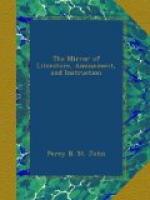“Dear Nelly,—It is now three months and better since that poor coffin was put under ground, and I declare I feel quite queer and lonesome without it. But business goes on quite well and brisk. Poor kind Peebles’s man! he is off and on; almost always about the house, doing some kind job or other. He is a very decent body; but, I don’t know how it is, I’m not to say comfortable. There’s a sad noise with my sister’s family. You know I never could bear children. My late husband, that’s gone, was the only one of the family that could. I am sure I don’t know what I could do without poor dear Peebles’s man. Yours to command, dear Nelly, MARY SMALL.
“Dear Nelly,—Poor dear kind Peebles’s man has never left here; he’s my right hand, and he is a very decent body indeed. It is now six good months since that poor funeral took place. I find I am not fit to live alone: I was married this morning to poor Peebles’s man. Your sincere friend, dear Nelly, MARY MERRIMATE.
“P.S. Excuse my change of name.”
* * * * *
THE GATHERER.
Electioneering.—In 1749, during the great contested election for Westminster, when Lord Trentham and Sir George Vandeput were candidates, Dr. Barrowby greatly interested himself in favour of the latter, who was put up to oppose the Court party. The doctor had for some weeks attended the noted Joe Weatherby, landlord of the Ben Jonson’s Head, in Russell-street, who had become emaciated by a nervous fever. During Dr. Barrowby’s visits, the patient’s wife, not knowing the doctor’s political attachment, had frequently expressed her uneasiness that her dear Joey could not get up, and vote for her good friend Lord Trentham. Towards the end of the election, when very uncommon means were used on both sides to obtain the suffrages of the people, the doctor, calling one morning on his patient, to his great astonishment, found him up and almost dressed.—“Hey-dey! what’s the cause of this?” exclaimed Barrowby. “Dear Doctor,” said poor Joe, in broken accents, “I am going to poll.”—“To poll!” replied the doctor, with much warmth, supposing him of the same opinion with his wife, “going to the d—l, you mean!—why, do you know the cold air may kill you. Get to bed, get to bed, man, as fast as you can, or immediate death may ensue!”—“Oh! if that is the case, sir,” returned the patient in a feeble voice, “to be sure I must act as you advise me; but I love my country, sir, and thought, while my wife was out, to seize this opportunity to go to Covent-garden church, and vote for Sir G. Vandeput.”—“How, Joe! for Sir George?”—“Yes, sir, I wish him heartily well.”—“Do you?” said the medical politician. “Hold, nurse! don’t pull off his stockings again; let me feel his pulse. Hey! very well—a good, firm stroke—Egad! this will do. You took the pills I ordered last night?”—“Yes,




